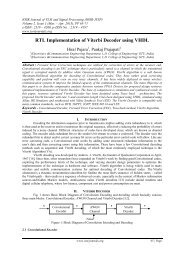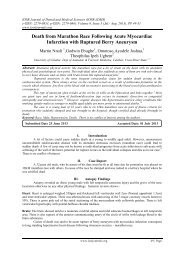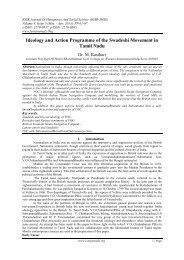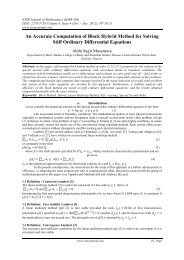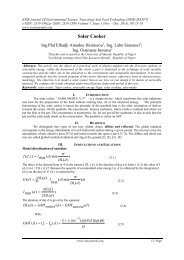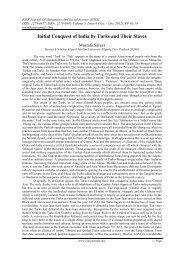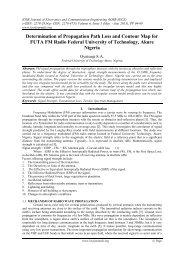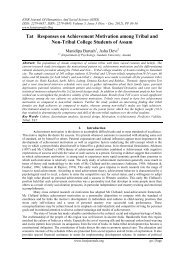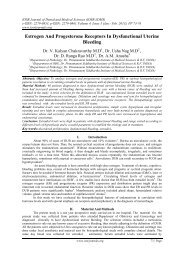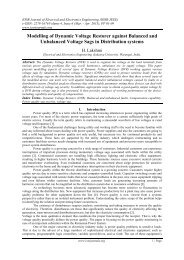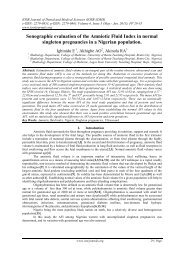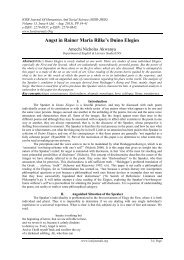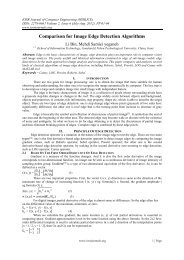Design Compatibility of Classroom Furniture in Urban and ... - IOSR
Design Compatibility of Classroom Furniture in Urban and ... - IOSR
Design Compatibility of Classroom Furniture in Urban and ... - IOSR
Create successful ePaper yourself
Turn your PDF publications into a flip-book with our unique Google optimized e-Paper software.
Div<strong>in</strong>e Revelation <strong>in</strong> Yoruba Traditional Religion <strong>and</strong> In Christianity<br />
who have discussed God as a universal concept <strong>and</strong> Be<strong>in</strong>g who reveals Himself to the entire human race <strong>in</strong> one<br />
form or another, past, present, <strong>and</strong> cont<strong>in</strong>uous. Hebblelethwaite (1980:8) warns that:<br />
Christians must cease to th<strong>in</strong>k <strong>of</strong> their faith as bear<strong>in</strong>g witness to God‟s f<strong>in</strong>al <strong>and</strong> absolute selfrevelation<br />
to man. Rather they must learn to recognize their experience <strong>of</strong> God <strong>in</strong> Christ to be but one <strong>of</strong> many<br />
different sav<strong>in</strong>g encounters with the div<strong>in</strong>e which have been given to different historical <strong>and</strong> cultural segment <strong>of</strong><br />
mank<strong>in</strong>d.<br />
That consciousness seems <strong>in</strong>dispensable to mutual <strong>and</strong> reciprocal respect, without which socio-political<br />
collaboration may be elusive <strong>in</strong> a religiously pluralistic society, such as Yorubal<strong>and</strong>. What is more, the whole<br />
idea <strong>of</strong> religious, racial, <strong>and</strong> cultural superiority has been dropped <strong>in</strong> many enlightened societies. Balogun<br />
(2012:7) asserts, for <strong>in</strong>stance, that he is “not <strong>in</strong>terested <strong>in</strong> extoll<strong>in</strong>g one religion above another”, neither does he<br />
“consider one religion per se better than another.” He believes rather that “religions are either acceptable or<br />
rejectable (sic) accord<strong>in</strong>g to how their adherents practice them”. Besides, he expresses what can be said to be the<br />
contemporary st<strong>and</strong>po<strong>in</strong>t that:<br />
Man is free to follow whichever religion <strong>in</strong> which he f<strong>in</strong>ds solace <strong>and</strong> tranquility. The f<strong>in</strong>al arbiter <strong>in</strong><br />
the matter <strong>of</strong> faith <strong>and</strong> religious practice is God; <strong>and</strong> I believe that He has not put the judgment <strong>of</strong> a person‟s<br />
conviction <strong>in</strong> another person‟s h<strong>and</strong>.<br />
That is the sum <strong>of</strong> contemporary civilization, which fully recognizes freedom <strong>of</strong> religion. Frankl<br />
(2000:149) is also <strong>of</strong> the view that “If religion is to survive it will have to become pr<strong>of</strong>oundly personalized<br />
religion which allows any human be<strong>in</strong>g to speak a language <strong>of</strong> his or her own when address<strong>in</strong>g himself or<br />
herself to the ultimate be<strong>in</strong>g.” One would reconstruct that statement to read that if religion is to survive <strong>in</strong><br />
Yorubal<strong>and</strong> <strong>and</strong> be devoid <strong>of</strong> violent crisis, it must be allowed freedom <strong>of</strong> practice. That is imperative if only<br />
because, as Troeltsch (1980:31) notes, “In our earthly experience Div<strong>in</strong>e Life is not one, but many”, while “to<br />
apprehend the one <strong>in</strong> the many constitute the special character <strong>of</strong> love.” Of course, where there is no love,<br />
misunderst<strong>and</strong><strong>in</strong>g, hatred, <strong>and</strong> conflict ensue. But the basic concern <strong>in</strong> this study is the extent to which a<br />
realization <strong>of</strong> the fact that div<strong>in</strong>e revelation takes diverse forms can help Christians to be more accommodat<strong>in</strong>g<br />
<strong>of</strong> other religionists <strong>in</strong> Yorubal<strong>and</strong> <strong>and</strong> elsewhere possibly.<br />
Etymologically, the word “revelation” derives from the Lat<strong>in</strong> revelare (to remove the veil), <strong>and</strong> the<br />
Greek translation is apocalypsis. In history <strong>of</strong> religions, two forms <strong>of</strong> div<strong>in</strong>e revelation are recognized, namely,<br />
natural or general revelation, <strong>and</strong> special or historical revelation. The former is said to be accessible to human<br />
be<strong>in</strong>gs through the natural order, which <strong>in</strong>cludes creation, human experience, <strong>and</strong> the <strong>in</strong>ner voice <strong>of</strong> conscience.<br />
Dulles (1992:94) notes that it is on the basis <strong>of</strong> natural revelation that Sa<strong>in</strong>t Paul could assert, as he has done,<br />
that “the Law <strong>of</strong> God is <strong>in</strong>scribed upon the human heart”, so that those who have not got the code <strong>of</strong> the Law<br />
from God can accomplish by nature what the Law requires (Rm. 2:4). Thus, it is generally believed that God‟s<br />
revelation is open to all human be<strong>in</strong>gs, <strong>in</strong>clud<strong>in</strong>g <strong>of</strong> course the Yoruba <strong>of</strong> western Nigeria.<br />
On the other h<strong>and</strong>, special or historical revelation refers to God‟s self-disclosure to <strong>in</strong>dividuals or<br />
groups through events with<strong>in</strong> history. With particular reference to the Judaeo-Christian tradition, Scanlon<br />
(1994:747) observes that special revelation means: “God‟s self-disclosure <strong>in</strong> the history <strong>of</strong> Israel <strong>and</strong> <strong>in</strong> the life,<br />
death, <strong>and</strong> resurrection <strong>of</strong> Jesus <strong>of</strong> Nazareth”. As Scanlon further notes, “the normative testimony to this div<strong>in</strong>e<br />
revelation is the Bible.” Some other Christians may add the catechetical book(s) <strong>of</strong> their church or churches, as<br />
the case may be.<br />
One would th<strong>in</strong>k that God would appear irresponsible if He does not reveal Himself <strong>and</strong> His will to<br />
whoever is made by Him. As a corollary, human be<strong>in</strong>gs can be responsible for their deeds only to the extent to<br />
which they know the will <strong>of</strong> God. It is rightly said that there can be no s<strong>in</strong>, where there is no law. The question<br />
then arises: Can there be a “special revelation” which is <strong>in</strong>dispensable for human salvation, but is unknown to<br />
the majority <strong>of</strong> human be<strong>in</strong>gs? The answer to that <strong>and</strong> similar questions are addressed, towards a clear<br />
underst<strong>and</strong><strong>in</strong>g <strong>of</strong> the nature <strong>of</strong> div<strong>in</strong>e revelation <strong>and</strong> mutual respect among human be<strong>in</strong>gs <strong>and</strong> their various<br />
traditions, with particular reference to Yorubal<strong>and</strong>.<br />
III. Div<strong>in</strong>e Revelation <strong>in</strong> Christianity<br />
The universal recognition <strong>of</strong> God does not seem to be <strong>in</strong> doubt. Weil (2007:15) notes that “It is<br />
impossible to prove that at the dawn <strong>of</strong> history man had no religion <strong>and</strong> later acquired one; rather the very<br />
opposite is true, for from earliest recorded time we have evidence from man‟s religious practices <strong>and</strong> beliefs that<br />
he had some consciousness <strong>of</strong> God.” That would be because, accord<strong>in</strong>g to Weil (p.12), “Man, although now a<br />
fallen creature, has not completely lost the image <strong>of</strong> God <strong>in</strong> which he was made; some knowledge <strong>of</strong> God<br />
rema<strong>in</strong>s <strong>in</strong> him.” With specific reference to how God reveals Himself to human be<strong>in</strong>gs, Weil (p.18) holds with<br />
theologians, such as Dulles (1992:94), Scanlon (1994:747), <strong>and</strong> P<strong>in</strong>nock (1998:585), that God has given human<br />
be<strong>in</strong>gs “two books to read <strong>and</strong> to study: the book <strong>of</strong> nature <strong>and</strong> the book <strong>of</strong> God, the Bible.” One would <strong>of</strong><br />
course expect a Muslim to mention the Qur‟an rather than the Bible, while a Yoruba might mention “Oral<br />
Traditions” (Idowu, 1996:5). Weil (same page) expla<strong>in</strong>s the book <strong>of</strong> nature thus:<br />
www.iosrjournals.org<br />
70 | Page



